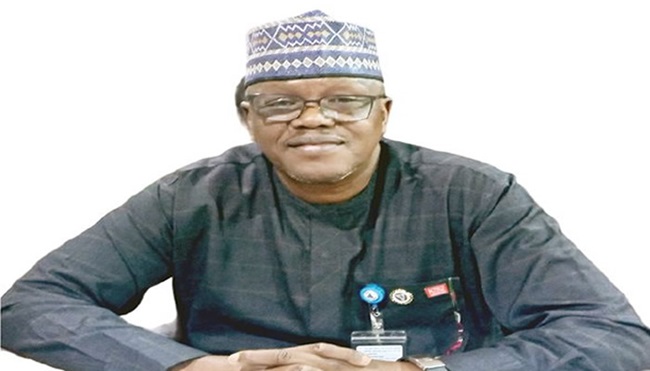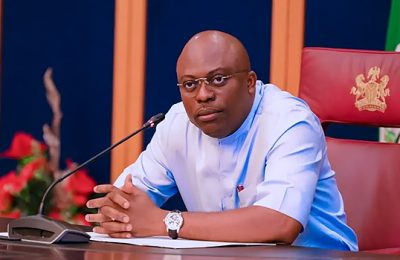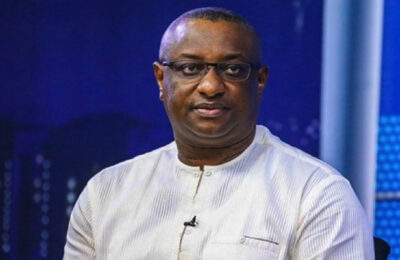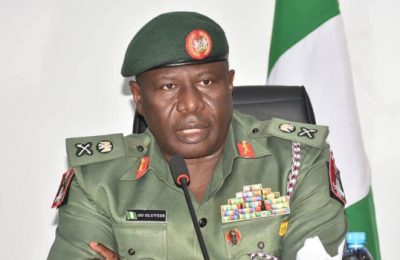Director General, Nigerian Army Resource Centre, Abuja, Major General Garba Wahab (retd.) has said that the nation continues to face security challenges because it is surrounded by Francophone countries.
Wahab stated this while delivering the distinguished personality lecture of the Faculty of Arts, University of Ibadan, titled: “The Military and the Gown: Forging Partnership for National Development,” at the Trenchard Hall of the university.
He argued that Niger Republic is one of the countries that border Nigeria where Boko Haram operates, and following the country’s withdrawal from the Economic Community of West African States (ECOWAS), most of the terrorists there are beginning to move into Nigeria.

This, he said is apart from the fact that other Francophone countries like Cameroon and Chad, where Boko Haram operates, also border Nigeria, and the terrorists there easily move into the country once the borders are porous.
As a result of the influx of terrorists from Francophone countries, he said the North-East, North-Central continue to experience security issues, just as he noted that the North-Central is also now threatened.
He added that the prevalence of non-state armed groups owing largely to the proliferation of weapons in the West African region, weak borders, sea and port control and increased transnational criminal syndicate accounted largely for insecurity in Nigeria.
Wahab particularly warned that with the North-Central threatened, zones across the River Niger, like the South-West are now under threat, demanding special security focus.

He said: “The challenge we are having as a nation is that we are surrounded by Francophone African countries. Because of the withdrawal of Niger Republic from ECOWAS, most of the terrorists in Niger Republic are beginning to move down to Nigeria, and a lot of others are coming in.
“Boko Haram operates in Cameroon, Chad and Niger; they move across these countries and when they feel the road is free, they move into Nigeria.”
“At a three-day seminar last week, we tried to find solutions to what is happening in North West. And it was very clear that the problems emanated from the North East, then moved to the North West and now the North Central is threatened.
“And if the North Central is threatened, it means you across River Niger, you in South West will be threatened. So we need to start looking at it.”
Speaking, Wahab noted that the country was hounded by multiple security challenges that vary from zone to zone.
In the North-East and North-West, he noted that there were issues of poverty, religious intolerance, insurgency, kidnapping and banditry by Boko Haram and Ansaru, its affiliate and Islamic State West Africa Province, while in the North-Central, there was long-standing rivalry over land between cattle herders and farmers fuelling intercommunal and interreligious conflicts.
For the South-East, he said security agencies have to grapple with separatist militias sparking tensions between the local population and government forces and reinvigorating secessionist movements.
The South-South, he noted faced issues of poverty, corruption, cultist groups, militant activities, oil-related criminal activities, sea piracy, and attacks on vessels on Gulf of Guinea while the South West had challenges of secessionist agitation, kidnappings and armed robbery.
He stressed that facing the peculiar geopolitical zone challenges is made difficult by poverty, inadequate physical and institutional infrastructure, poor human resource development, lack of security, unemployment and underdevelopment, and diseases.
These, he noted, made achieving the goal of national development and competing comparatively globally difficult.
Other challenges, he said, hindered the efficient operations of security agencies in Nigeria were inadequate funding, equipment failures and constraints, difficulty in accessing remote terrains, language barrier.
The Army Centre Director-General described the huge youth population of the country as a ticking time bomb.
This is as he said security agencies also had to battle a lot of misinformation being passed around by people with ulterior motives to create disruption, disharmony, and discontent among Nigerians.
Wahab said a partnership with the academia would entail the military leaving the challenges at the doorstep of the gown to find solutions to them.
He said academics’ prior knowledge and experience studying certain areas can be activated, while they can provide expert knowledge to military planners or commanders on their areas of operation.
“Recall that during Operation Desert Strom by US military in Iraq in 2003, a professor of desert warfare was engaged to give informed information about mankind’s experience on fighting in the desert.
“Academic experts have experts in diverse areas who could aid Armed Forces of Nigeria’s operations before, during and after as obtained in other climes.
“Military and academics could collaborate to build robust tactics, strategies, training, weapons, equipment and logistics systems.
“Synergy between academia and security agencies creates an opportunity to develop innovative solutions and improve national security. With collaboration, they can address emerging security threats effectively and contribute to the overall progress and development of the nation.
“Collaboration could be tailored for specific purposes: weapon production, drones and artificial intelligence, forensics, medicine, cyber security, space technologies. Engagement could also be in personnel exchange agreements or programmes.
“Research and development is crucial to empowerment of military, through partnership with institutions and supporting effective and efficient research activities to meet needs of service members and nation at large.”
In their remarks, the Dean of Arts, University of Ibadan, Professor S.O. Oyetade, and other participants at the event, noted that the lecture was organized because the ivory tower yearned to know ways to collaborate with the military to contribute towards national development.
READ ALSO FROM NIGERIAN TRIBUNE







